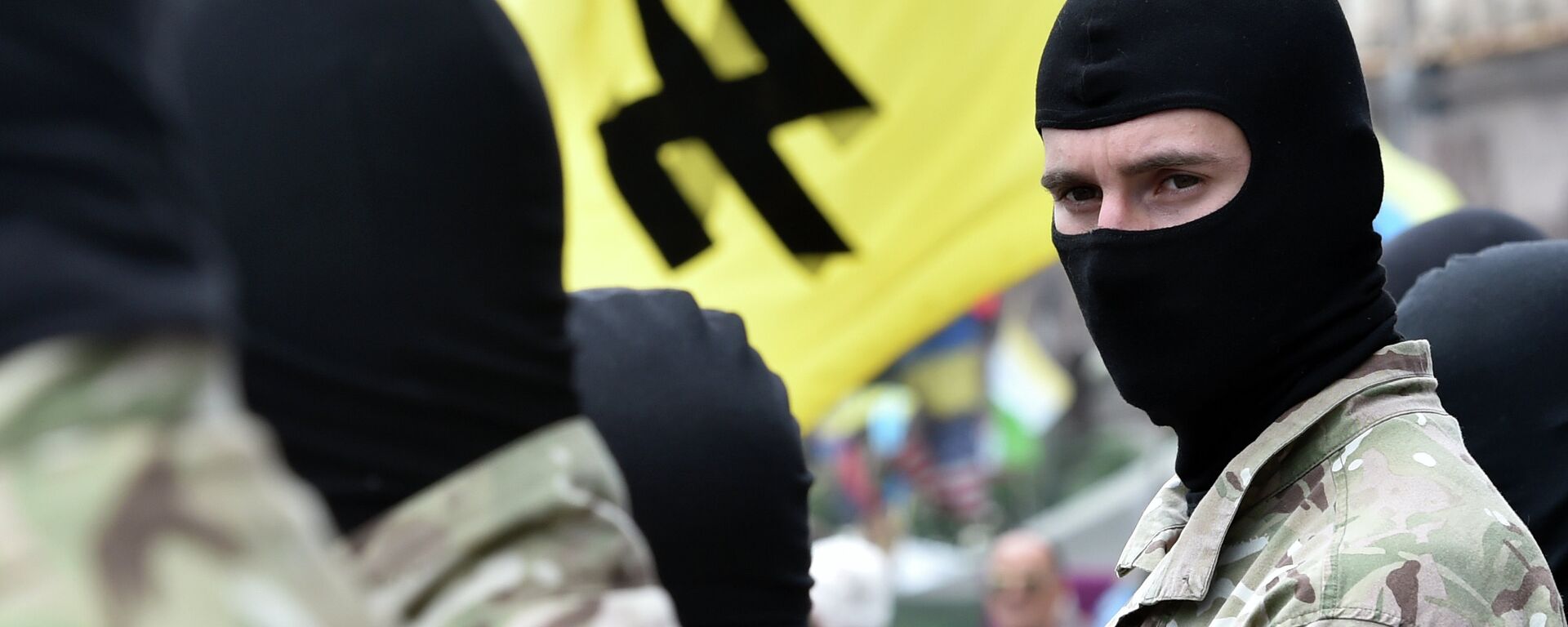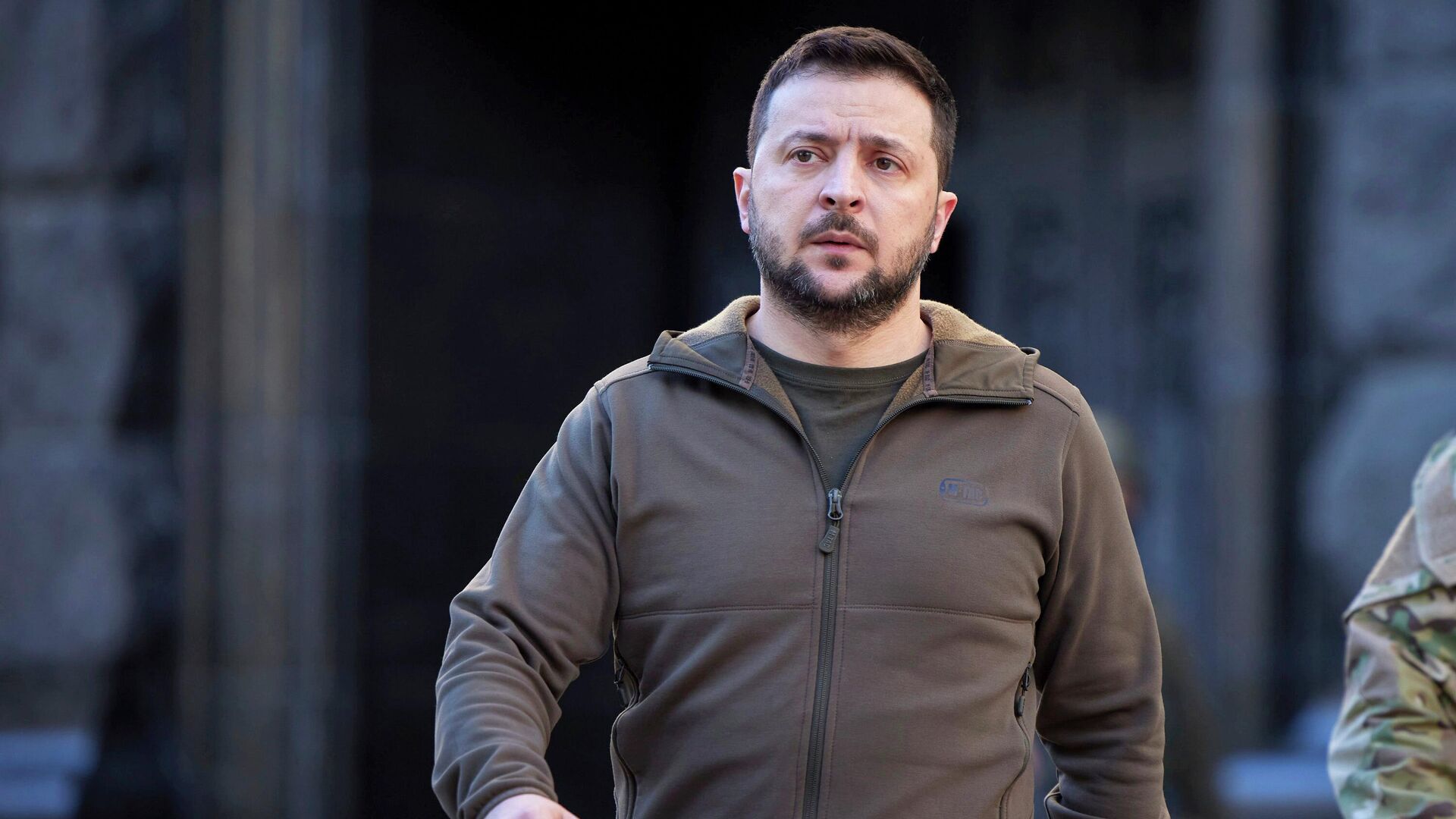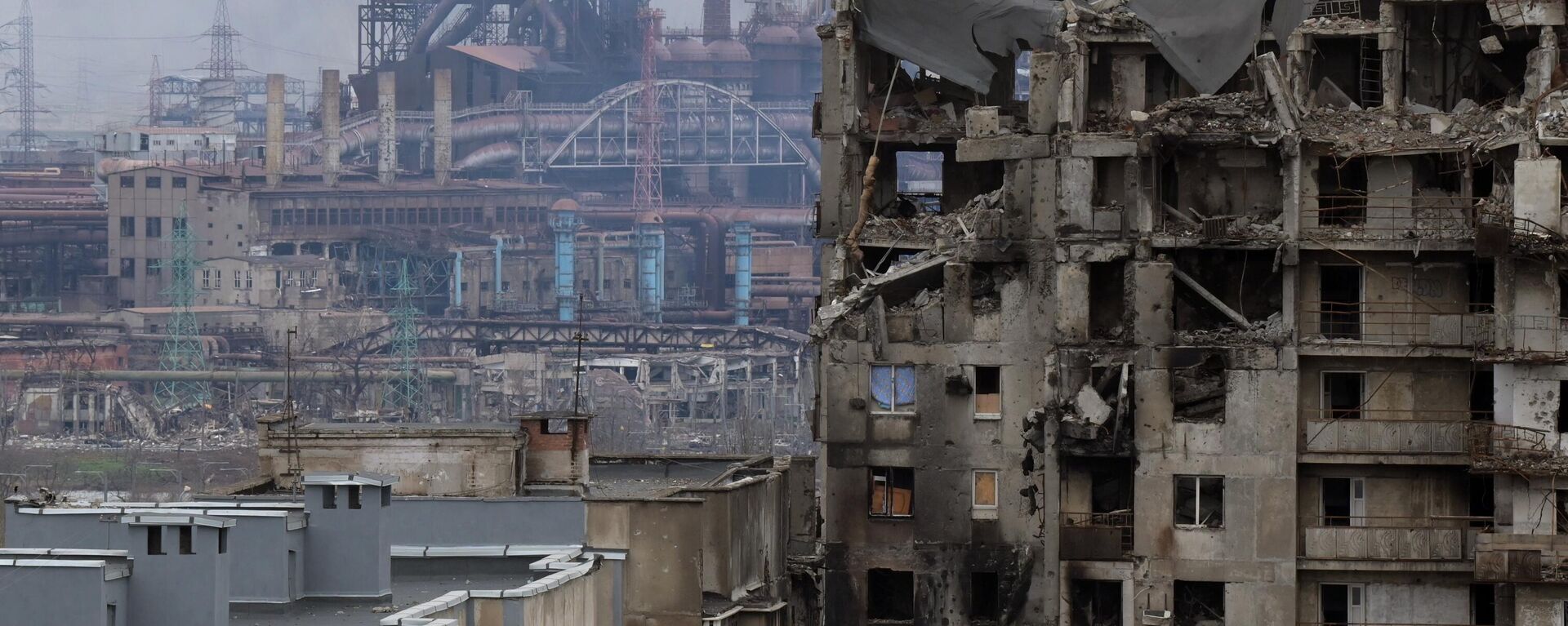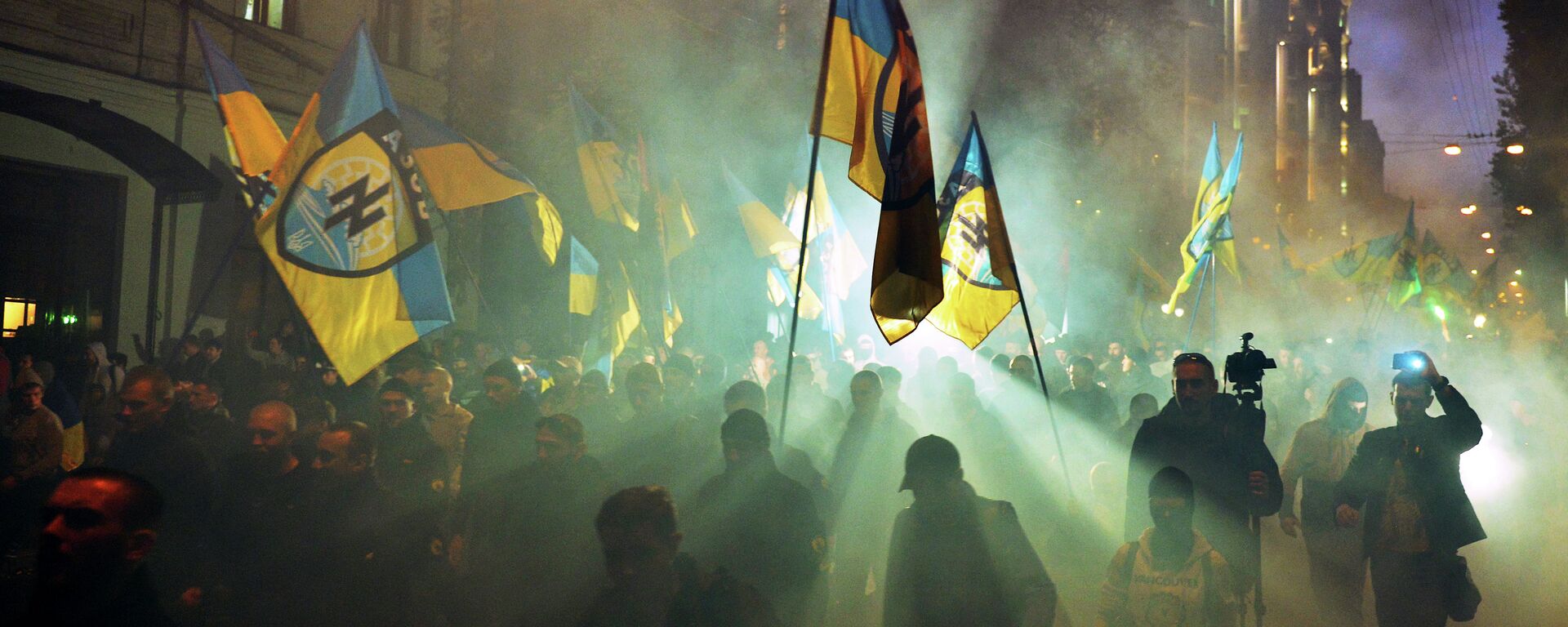https://sputnikglobe.com/20220502/zelensky-grateful-to-azov-neo-nazis-claims-ukraine-hardly-has-any-radicals-1095191804.html
Zelensky 'Grateful' to Azov Neo-Nazis, Claims Ukraine Hardly Has Any Radicals
Zelensky 'Grateful' to Azov Neo-Nazis, Claims Ukraine Hardly Has Any Radicals
Sputnik International
On 7 April, when Zelensky addressed the Greek parliament, two Greek militants of the neo-Nazi Azov battalion also delivered speeches to the lawmakers, sparking... 02.05.2022, Sputnik International
2022-05-02T05:10+0000
2022-05-02T05:10+0000
2022-11-18T09:24+0000
russia's special operation in ukraine
azov battalion
ukraine
ukraine crisis
volodymyr zelensky
greece
neo-nazis
https://cdn1.img.sputnikglobe.com/img/07e6/05/02/1095192061_0:0:3000:1688_1920x0_80_0_0_d1f9acf5b8a0efae69b1b88e6b34730a.jpg
Ukrainian President Volodymyr Zelensky told Greece's ERT network that he is grateful to the neo-Nazi Azov battalion and other "volunteers", whoever they may be. He also asserted his belief that there are "almost no" calls for radicalism in Ukraine.In the interview, broadcast on Sunday, Zelensky was asked about his attitude towards the Azov battalion in light of the most recent public outrage. The Ukrainian president, who spoke both in Ukrainian and English during the interview, said that back in 2014, "volunteers from different parts of the state united to defend Ukraine", because the country did not have such a "powerful" army as it "has" today.However, he admitted that he can see the difference between the Ukrainian military and the nationalist battalions. According to Zelensky, the radical calls of the Ukrainian nationalist formations against the Russians were their "personal opinion", and that there is a difference between them and the position of the military.According to Zelensky, Mariupol is "defended" by professional soldiers, and not only by the Azov battalion, to which he is grateful, once more highlighting their "professionalism".The president claimed, however, that he and his office are keeping a close eye on events. This is not the first time the Ukrainian president has heaped praise on the neo-Nazi battalion. Last month, he addressed the Greek parliament, with his speech including a video message from two Greek Azovites. Their appearance ignited a huge political row in Greece, with opposition parties and influential members of the ruling New Democracy party slamming their address.The former prime minister, Antonis Samaras, stressed that allowing the Azov video message to be broadcast in the Greek Parliament was a "big mistake", and the country's socialists wondered why Greek lawmakers hadn't been informed in advance about the neo-Nazis' speech.Greek government spokesman Giannis Oikonomou said that showing the message from the Azov battalion was “incorrect and inappropriate”.Over the eight years of the conflict in Donbass, members of the Azov regiment - whose ideas are similar to those of the Ukrainians who collaborated with the Nazis in the Second World War - have been accused of war crimes in the region, including kidnapping, torture, and indiscriminate looting.Some of the fighters use insignia that is strikingly similar with Nazi emblems. For a long time, the Azov, along with other radical and extremist groups, were referred to as such in western media, but with events in the country having taken the course they have, many media have backtracked on their rhetoric against Ukrainian neo-Nazis, sometimes to the extent that they seem to be parroting Kiev's propaganda, calling them "defenders".Russia launched a special military operation to demilitarise and de-Nazify Ukraine on 24 February. The Russian president, Vladimir Putin, stressed that he could no longer ignore the plight of Donbass inhabitants, who had experienced years of genocide at the hands of the Kiev regime, and ordered the operation in response to a call by the Donetsk and Lugansk People's republics.
https://sputnikglobe.com/20220228/belligerent-rhetoric--ss-style-regalia-who-are-right-sector-and-neo-nazi-azov-1093451807.html
https://sputnikglobe.com/20220430/azovstal-worker-russias-special-op-was-the-only-way-to-end-azovs-hellish-reign-over-mariupol-1095169980.html
https://sputnikglobe.com/20220407/absolute-humiliation-greek-lawmakers-incensed-over-zelensky-speech-alongside-neo-nazi-fighters-1094561894.html
ukraine
greece
Sputnik International
feedback@sputniknews.com
+74956456601
MIA „Rosiya Segodnya“
2022
News
en_EN
Sputnik International
feedback@sputniknews.com
+74956456601
MIA „Rosiya Segodnya“
Sputnik International
feedback@sputniknews.com
+74956456601
MIA „Rosiya Segodnya“
azov battalion, ukraine, ukraine crisis, volodymyr zelensky, greece, neo-nazis
azov battalion, ukraine, ukraine crisis, volodymyr zelensky, greece, neo-nazis
Zelensky 'Grateful' to Azov Neo-Nazis, Claims Ukraine Hardly Has Any Radicals
05:10 GMT 02.05.2022 (Updated: 09:24 GMT 18.11.2022) Kirill Kurevlev
Managing Editor
On 7 April, when Zelensky addressed the Greek parliament, two Greek militants of the neo-Nazi Azov battalion also delivered speeches to the lawmakers, sparking an outcry in the country. All the political parties were united in their condemnation of the neo-Nazis' performance, and the government subsequently branded their appearance as a "mistake".
Ukrainian President Volodymyr Zelensky told Greece's
ERT network that he is grateful to the neo-Nazi Azov battalion and other "volunteers", whoever they may be. He also asserted his belief that there are "almost no" calls for radicalism in Ukraine.
In the interview, broadcast on Sunday, Zelensky was asked about his attitude towards the Azov battalion in light of the most recent
public outrage.
The Ukrainian president, who spoke both in Ukrainian and English during the interview, said that back in 2014, "volunteers from different parts of the state united to defend Ukraine", because the country did not have such a "powerful" army as it "has" today.
However, he admitted that he can see the difference between the Ukrainian military and the nationalist battalions. According to Zelensky, the radical calls of the Ukrainian nationalist formations against the Russians were their "personal opinion", and that there is a difference between them and the position of the military.
"There is also the Azov battalion, which does not consist of volunteers, but is part of the national guard of our state. Today it is part of the armed forces, and all of them are the official army of our state. Some of those who were volunteers at the beginning of the war moved into politics and stayed there. Those who decided to continue serving in the armed forces of Ukraine became military and are part of the armed forces of Ukraine. These are two different things," Zelensky said.

28 February 2022, 15:12 GMT
According to Zelensky, Mariupol
is "defended" by professional soldiers, and not only by the Azov battalion, to which he is grateful, once more highlighting their "professionalism".
"There is also the National Guard, border guards, special forces, and there are the armed forces of Ukraine," he added.
The president claimed, however, that he and his office are keeping a close eye on events.
"And if there are challenges or calls for radicalism, I believe that there are much fewer in Ukraine than in other countries on Earth," he claimed. "I think that we have almost none. Despite the fact that we are at war, If such radical sentiments were to emerge, we would take them very seriously and immediately take all necessary steps against them, believe me."
This is not the first time the Ukrainian president has heaped praise on the neo-Nazi battalion. Last month, he addressed the Greek parliament, with his speech including a video message from two Greek Azovites. Their appearance ignited a huge political row in Greece, with opposition parties and influential members of the ruling New Democracy party slamming their address.
“The neo-Nazi Azov battalion members' speech in the Greek Parliament is a provocation. The absolute responsibility lies with [Greek] Prime Minister Kyriakos Mitsotakis. He talked about a historic day, but it is a historic shame. Solidarity with the Ukrainian people is a given. But the Nazis cannot have a say in Parliament,” Syriza leader Alexis Tsipras wrote on social media.
The former prime minister, Antonis Samaras, stressed that allowing the Azov video message to be broadcast in the Greek Parliament was a "big mistake", and the country's socialists wondered why Greek lawmakers hadn't been informed in advance about the neo-Nazis' speech.
Greek government spokesman Giannis Oikonomou said that showing the message from the Azov battalion was “incorrect and inappropriate”.
Over the eight years of the conflict in Donbass, members of the Azov regiment - whose ideas are similar to those of the Ukrainians who collaborated with the Nazis in the Second World War - have been
accused of war crimes in the region, including kidnapping, torture, and indiscriminate looting.
Some of the fighters use insignia that is strikingly similar with
Nazi emblems. For a long time, the Azov, along with other radical and extremist groups, were referred to as such in western media, but with events in the country having taken the course they have, many media have backtracked on their rhetoric against Ukrainian neo-Nazis, sometimes to the extent that they seem to be parroting Kiev's propaganda, calling them "defenders".
Russia launched a special military operation to demilitarise and de-Nazify Ukraine on 24 February. The Russian president, Vladimir Putin, stressed that he could no longer ignore the plight of Donbass inhabitants, who had experienced years of genocide at the hands of the Kiev regime, and ordered the operation in response to a call by the Donetsk and Lugansk People's republics.







